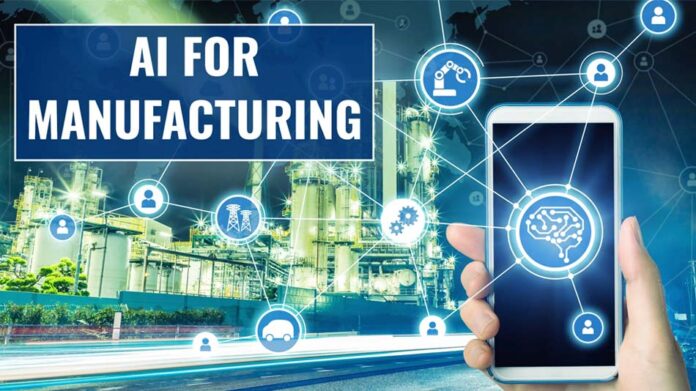Table of Contents
These days, the word AI(Artificial intelligence) can be seen or heard from every corner of the world, for small things or through news. Its revelation in various industries is outstanding, including the manufacturing Industry.
The researchers have to say that the expected marketing growth of AI in the manufacturing industry will be USD 20.8 billion by 2028. Therefore, with the revolution of artificial intelligence in manufacturing, the industry will see a massive transformation across various processes in the coming years.
There are numerous benefits of integrating AI in manufacturing, and if you own a manufacturing company, then this is a time to make a fruitful decision to leverage AI in the manufacturing sector. Well, this blog will drive through the use cases and the importance and the future of AI in manufacturing sectors.
Practical Use Cases of AI in Manufacturing Industries
Leveraging Artificial intelligence in manufacturing can drive enterprises to a competitive edge. AI in Manufacturing has some exciting use cases, will see them with some examples used by top brands in their sector.
Inventory Management
Managing inventory in the manufacturing sector and in retail operations is a very tough aspect for enterprises. Inventory management is a necessary aspect of the manufacturing sector, and through manual possession, it becomes problematic. Therefore, AI can be a management partner in improving the inventory process with its automation process.
One great example is Walmart, the greatest retail operation operator, which has integrated AI into its inventory management to analyze huge amounts of inventory data across its stores.
Supply Chain Optimization
The supply chain is one of the most important areas on which the manufacturing sector depends. Therefore, it needs an emerging technology that can make a better road map for improving supply chain processes. By leveraging the power of AI in supply chain operations, enterprises can significantly improve their overall process with efficiency and cost savings.
There are various top bands that have implemented AI in their process, and the good thing is they are earning a lot. Companies like Amazone and Alibaa, the two revolving bands, are at the top position in their competition. This company is mostly focused on fastening their delivery process to their customers.
Factory Task Automation
Automating factory tasks will be a significant relief to every enterprise managing their manufacturing areas. Integrating AI and ML can make this true, where enterprise can manage their factory task with productivity, effective and complete with effective cost.
The promising example of AI and ML to manage this task is robotics, which will automatically perform the tasks continuously to provide effective solutions to enterprises. AI-driven robotics will collaborate with humans and control wastage, quality control, and increased productivity.
Warehouse Management
The warehouses are in huge areas, and managing them is a difficult task. Artificial intelligence here can play a significant role in managing warehouse operations. With AI-powered solutions, businesses can handle whole warehouse operations, from sales data to stock availability, within no time.
Some large enterprises are already seen managing their warehouse operation through AI-powered solutions to improve the process, reduce costs, and ensure products are available as requested by the customer.
Testing and Quality Control
Every manufacturing sector has a person who does product testing and quality checks. Sometimes, humans can’t detect defects or errors accurately. At the same time, AI-powered systems like computer vision sensors can quickly detect defects and errors that are more accurate and efficient. It is good to connect with AI development services providers, who will provide you with the perfect plans and solutions for building such effective systems.
New Product Development
Developing a new and unique product in manufacturing can be game-changing for a firm. Integrating AI in manufacturing has the potential to bring an innovative approach to building a unique product, change the structure of the firm, and be pioneering in the industry.
AI and ML in manufacturing perform a key role by analyzing waste amounts of data on a daily basis to market insights together, understand the customer’s preferences, and, based on that, allow firms to make effective decisions in making a new product.
Benefits of AI in Manufacturing
Effective Prediction
In the Manufacturing industry, enterprises make predictions on the following products to understand the market and the customers. Most of the time, they have to rely on their competitors. By enabling AI-based prediction systems, enterprises can effectively understand the market and the customers; this will help them to prevent investing in unwanted products and reduce maintenance costs and other unwanted costs.
Enhance Product Quality
With advances in AI technology, the automation process is in high demand; implementing AI in the manufacturing industry will help identify defective products and maintain an enterprise’s quality standards.
Process Optimization
AI and ML developers analyze vast amounts of manufacturing data to identify new product development opportunities or improvements in current operations. By doing so, businesses can speed up the development process and reduce unwanted costs.
Prevent from Errors
Businesses face huge losses in their manufacturing areas due to various errors. Advanced AI algorithms can enhance the work process by analyzing the working structure and previous errors to prevent them in the future. Hire AI developers to implement AI in your business operations to reduce errors and improve the manufacturing environment.
Summary: How AI Will Change the Future of the Manufacturing Sector?
Artificial intelligence is set to change the future of the manufacturing industry with its advanced features and algorithms. We have already seen in the beginning of AI’s market growth in the manufacturing industry, which is excellent. The AI revolution in manufacturing and other industries has shown quality work with automation processes, identifying defects and errors and improving security to ensure high-quality products reach the market.
Overall, the future of the manufacturing sector with AI is in safer hands. AI will play a key role in analyzing market trends, developing new products, and improving customer satisfaction; this will lead to a significant cost saving.















